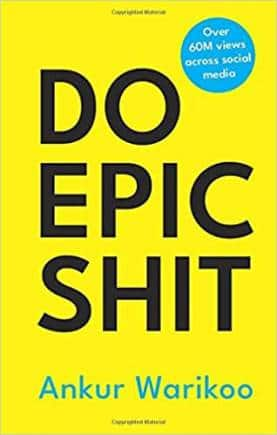



Ankur Warikoo, former CEO of nearbuy.com and Groupon’s India business, has reinvented himself as a content creator whose videos focus on success and failure, money management and relationships. He spoke to us about his book Do Epic Shit (2021), published by Juggernaut Books, and targeted at readers aged 18-30.
How was writing for a book different from writing for social media?It wasn’t different. I’ve been blogging since 2005 and creating videos since 2016. The book is a compilation of all the powerful thoughts that I have shared on social media. I didn’t set out to write this book. I created lots and lots of content; the best of that became the book.
Who inspires you?I am a sponge. I love people’s stories. I believe that everyone has some story in there that I can learn from. Some people do a good job of narrating their story consistently, so they are my natural affinity points. With other people, I have to suck the best out of them.
Among the more consistent ones, I love Naval Ravikant, who is an entrepreneur and a deep thinker. He is someone that I have been deeply inspired by. I love his thinking.
I have drawn a lot of inspiration from Gautam Buddha, and just his general ideology towards life. I am an atheist, so I do not follow any religion or practise any faith. For me, the life of the Buddha has been quite fascinating. He is someone that I would love to meet in person.
Thirdly, I would say Gary Vaynerchuk, an entrepreneur in the US. He has been creating content for more than a decade. I love his consistency, his audacity, and how he has reinvented himself again and again. I would like to do exactly that.
Also read: Naval Ravikant’s formula for health, wealth and good lifeYou write about how consistency plus authenticity is the magic formula to crack the content game. Could you explain it for people who haven't read the book?You are trying to speaking to the audience that you are creating the content for, and the algorithm on the platform that you are creating the content on. This could be Instagram, Twitter, Facebook, YouTube, or anywhere else. One side of it is emotional, the other side is automated. You have to cater to both. The easiest thing that appeals to both is consistency. It does not mean quality. It just means that you show up at a predetermined time.
For example, we publish a video on YouTube every Tuesday, Thursday and Saturday at 9.30pm, come rain, sunshine, flood, earthquake. That will happen. We haven’t missed a single day since we started with this schedule. People expect that this is going to happen, and their expectations are fulfilled every single time. The algorithm thinks that it can trust this guy who is going to show up thrice a week at the same time.
The only way that you can be consistent in life is by doing something that is authentically you. If you are going to have to become someone else, you are never going to be consistent.
 How can creators ensure that their content is creating value, not just noise?
How can creators ensure that their content is creating value, not just noise?Let me tell you about the most important thing that content creators miss out on. They begin by asking, “What do people want?” They forget to ask, “What do I have to give?” The intersection of what people want and what you are good at is important. What you are good at is something that you can build towards, keep improvising on, but you cannot miss out. Before I started creating content on personal finance, there were many people who were already doing it. I spoke from my own experiences. This is something most content creators do not focus on. You should bring your own personality, delivery, and story into that journey.
How can entrepreneurs monetize time on social media, without getting people addicted?Yes, because what you have is the currency of attention. That is the most valuable asset you are creating. Think about what adds value to them, even if you are selling. A good example is what I do in terms of affiliate income. I recommend books and other products on Amazon, and courses that I have benefited from on Udemy. I also have an affiliate income from Zerodha. If people open a brokerage account, and buy and sell stocks on that, I get an income out of it. I am essentially creating value by saying that here are the books and courses that I love, and here is the platform that I use to buy and sell stocks. I say: You can consider it too. I make this income with no additional cost to the people who click on links that I share. If they happen to buy something, I get a percentage of the sales that they have generated.
What ethical considerations should creators in the social commerce space look into?Endorsing something that you don’t believe in! For every brand that I work with, I say no to 9 or 10 brands. I could be making four times the money that I am making, but I have a policy of working only with brands that I personally use or where I know the founders directly. Creators need to think about ethics, else they will lose the currency of attention and trust.
Discover the latest Business News, Sensex, and Nifty updates. Obtain Personal Finance insights, tax queries, and expert opinions on Moneycontrol or download the Moneycontrol App to stay updated!
Find the best of Al News in one place, specially curated for you every weekend.
Stay on top of the latest tech trends and biggest startup news.